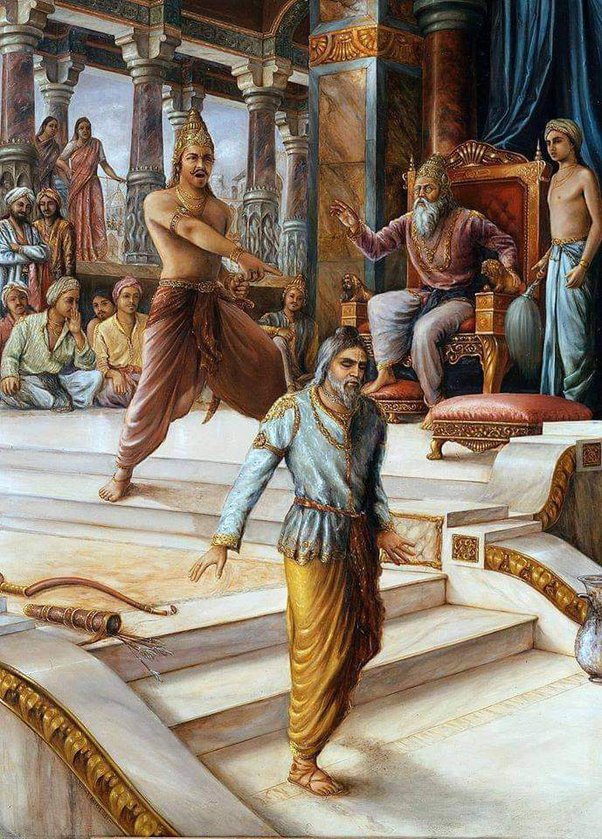In the vast and intricate tapestry of the Mahabharata, Vidura stands out as a paragon of wisdom, virtue, and righteousness. Despite his secondary status in the royal family, his insights, integrity, and unwavering commitment to dharma make him one of the most respected and pivotal characters in the epic. This blog delves into the life, character, and teachings of Vidura, highlighting his significance in Hindu mythology.
Birth and Early Life
Vidura’s birth is shrouded in divine mystery and a tale of extraordinary circumstances. He was born to the sage Vyasa and a maid named Parishrami through the process of niyoga, after Ambika and Ambalika, the queens of Vichitravirya, failed to conceive heirs with Vyasa due to their fear-induced reactions. Ambika bore the blind Dhritarashtra, and Ambalika bore the pale Pandu, but it was Parishrami, the maid, who gave birth to Vidura, who was wise and without any physical defect.
Vidura’s status was always lower than his half-brothers, Dhritarashtra and Pandu, because of his mother’s lower social standing. Nevertheless, his wisdom and virtue were unparalleled, making him a trusted advisor and the moral compass of the Kuru dynasty.
Mandavya’s Curse
Vidura’s life was also influenced by the curse of the sage Mandavya. The sage cursed Yama, the god of death and righteousness, to be born as a mortal for punishing him unjustly. Consequently, Yama was born as Vidura, bringing with him the divine qualities of justice and righteousness that he embodied throughout his life.
Vidura’s Role in the Kuru Court
Vidura served as the prime minister of the Kuru kingdom and was known for his unwavering commitment to dharma (righteousness). His counsel was sought by both the Pandavas and the Kauravas, though it was often ignored by the latter, leading to disastrous consequences.
The Game of Dice
Vidura played a crucial role during the infamous game of dice, where Yudhishthira, the eldest Pandava, lost his kingdom, brothers, and even his wife Draupadi to the cunning Shakuni. Vidura vehemently opposed the game and warned Dhritarashtra and Duryodhana about the consequences. He was the only one, aside from Vikarna, who protested against the humiliation of Draupadi, showcasing his deep sense of justice and empathy.
Krishna’s Visit
When Lord Krishna visited Hastinapura as a peace emissary, he chose to stay at Vidura’s humble abode rather than in the opulent palace of Duryodhana. This gesture highlighted Krishna’s respect for Vidura’s wisdom and righteousness. Vidura’s hospitality and genuine love stood in stark contrast to Duryodhana’s deceitful intentions.
Vidura Niti: The Wisdom of Vidura
Vidura’s teachings, known as Vidura Niti, are a treasure trove of ethical and moral guidance. These teachings are compiled in the Udyoga Parva of the Mahabharata and offer valuable insights into leadership, governance, and personal conduct. Some key principles from Vidura Niti include:
- Compassion and Welfare: A leader should always work for the welfare of all and show compassion to all creatures.
- Justice and Fairness: A ruler should be fair, accessible, and protect those dependent on him.
- Virtue and Prosperity: Prosperity and success should be attained and sustained through virtuous deeds.
- Learning and Growth: Continuous learning and knowledge transmission should be encouraged.
- Righteous Conduct: One should avoid anger, pride, vanity, and should act with purpose and calmness.
Kurukshetra War and Vidura’s Death
As the Kurukshetra war loomed, Vidura’s warnings and advice were largely ignored by the Kauravas. Disheartened by Duryodhana’s arrogance and Dhritarashtra’s helplessness, Vidura eventually sided with the Pandavas, recognizing their adherence to dharma.
After the war, Vidura resumed his role as the prime minister under Yudhishthira’s reign. Later in life, he accompanied Dhritarashtra, Gandhari, and Kunti to the forest to lead a life of asceticism. Vidura’s death was as serene as his life; his spirit is believed to have merged with Yudhishthira’s, symbolizing their shared essence of righteousness and justice.
Legacy and Influence
Vidura’s legacy is enduring, with his life and teachings continuing to inspire generations. In the realm of governance, ethics, and personal development, Vidura Niti remains a relevant and respected guide. Vidura is also celebrated in various cultural and literary works, highlighting his timeless appeal as a beacon of wisdom and virtue.
In conclusion, Vidura’s life in the Mahabharata exemplifies the ideals of wisdom, righteousness, and unwavering commitment to dharma. His teachings and actions serve as a profound reminder of the power of virtue and the importance of ethical conduct, making him a revered figure in Hindu mythology.
Note: Blog based on publicly available information.


Leave a Reply